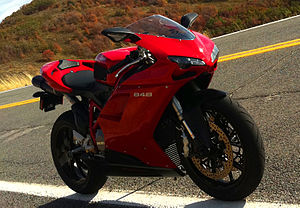Ducati is an Italian motorcycle-manufacturing company that is part of the Ducati group, and is headquartered in Bologna, Italy. The company is directly owned by Italian automotive manufacturer Lamborghini, whose German parent company is Audi, itself owned by the Volkswagen Group.

The Ducati Monster is a standard, or naked bike, motorcycle designed by Miguel Angel Galluzzi and produced by Ducati in Bologna, Italy, since 1993. In 2005, Monster sales accounted for over half of Ducati's worldwide sales. Like most modern Ducati motorcycles, it has a 90° V-twin engine, called an L-twin by Ducati, with desmodromic valves, and tubular steel trellis frame, designed by Fabio Taglioni (1920–2001).
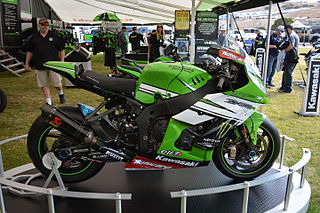
The Kawasaki Ninja ZX-10R is a motorcycle in the Ninja sport bike series from the Japanese manufacturer Kawasaki, the successor to the Ninja ZX-9R. It was originally released in 2004 and has been updated and revised throughout the years. It combines an ultra-narrow chassis, low weight, and radial brakes. In 2004 and 2005 the ZX-10R won Best Superbike from Cycle World magazine, and the international Masterbike competition.
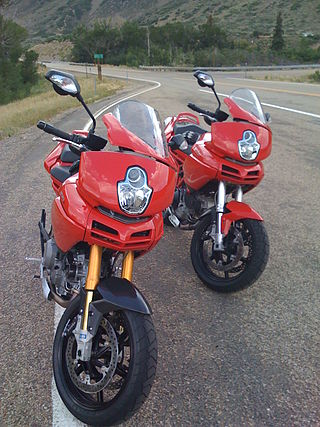
First introduced in 2003, the Ducati Multistrada is a series of V-twin and V4 touring focused motorcycles. Essentially a hybrid of a supermoto and a sport-tourer, the Multistrada competes in the market with other dual-sport motorcycles such as the BMW GS. The first iteration of the Multistrada was, like the Yamaha TDM850, neither intended nor suitable for off-road use. Subsequent models were more suited to a proper dual-sport role.

The Suzuki GSX-R750 is a sports motorcycle made by Suzuki since 1985. It was introduced at the Cologne Motorcycle Show in October 1984 as a motorcycle of the GSX-R series.

The Suzuki GSX-R1000 is a supersport motorcycle made by Suzuki. It was introduced in 2001 to replace the GSX-R1100 and is powered by a liquid-cooled 999 cc (61.0 cu in) inline four-cylinder, four-stroke engine although originally 988 cc (60.3 cu in) from 2001 to 2004.
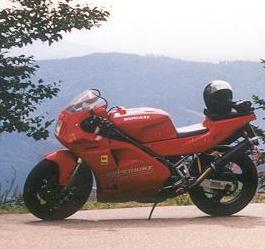
The Ducati 888 was a motorcycle manufactured by Ducati as an upgrade to the Ducati 851. The earlier 851 had introduced liquid cooling, computerized fuel injection and four-valve heads to the company's two cylinder motors. In 1991 Ducati increased the capacity of the 851 to 888 cc to create the 888. Both engines featured the Desmoquattro valvetrain concept in which a four valve per cylinder motor was given desmodromic valve actuation, with cams both opening and closing the valves. Ducati's desmodromic system reduces the frictional penalty from conventional valve springs.

The Ducati 749 is a 90° V-twin Desmodromic valve actuated engine sport bike built by Ducati Motor Holding between 2003 and 2006. Designed by Pierre Terblanche, the 749 was available as the 749, 749 Dark, 749S, and 749R. It shared many of its parts with the 999, with the exception of a slightly smaller 180/55 profile rear tire, smaller cylinders, and different cylinder heads, giving it a smaller displacement of 748 cc. This smaller engine is higher revving and produces a lower peak horsepower than the larger engine used in the 999. The 749S model, like the 999, incorporates features rarely found on production motorcycles, including adjustable rake and five-position adjustable rearset mounts.
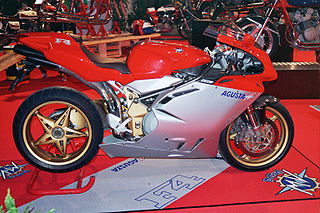
The MV Agusta F4 is an inline four-cylinder sport bike made by MV Agusta from 1999 until 2018. It was the motorcycle that launched the resurrection of the brand in 1998. The F4 was created by motorcycle designer Massimo Tamburini at CRC, following his work on the Ducati 916. The F4 has a single-sided swingarm, large diameter front forks and traditional MV Agusta red and silver livery. The F4 engine is also one of the few production superbikes to have a hemi-spherical cylinder head chamber design with 4 valves per cylinder.

The Ducati Desmoquattro are water-cooled, four-valve engines from Ducati. They have been produced since 1985 in capacities from 748 to 1,198 cc.

The Ducati Pantah was an Italian motorcycle with a 90° V-twin engine, produced between 1980 and 1986.
The Ducati Hypermotard is a supermotard Ducati motorcycle designed by Pierre Terblanche and was first seen at the November 2005 EICMA trade show in Milan. The Hypermotard was awarded "Best of Show" at EICMA and has since won other show awards. The Hypermotard has a 939 cc (57.3 cu in) dual spark 'Desmo' or 'Desmodromic' liquid-cooled two-valve 90° V-twin engine with fuel injection and weighs under 180 kg (400 lb). The Hypermotard is capable of speeds in the region of 125 mph (201 km/h).

The Ducati 1098 is a sport bike made by Ducati from 2007 to 2009, in three versions, the 1098, 1098S, and 1098R. The 1098 was succeeded by the 1198 in 2009, though the 1098R remained in production that year.

BMW S1000RR is a race oriented sport bike initially made by BMW Motorrad to compete in the 2009 Superbike World Championship, that is now in commercial production. It was introduced in Munich in April 2008, and is powered by a 999 cc (61.0 cu in) four-cylinder engine redlined at 14,200 rpm.
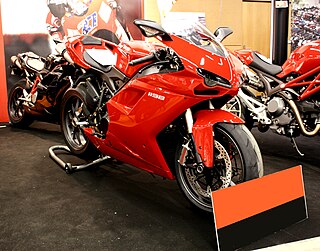
The Ducati 1198 is a sport bike made by Ducati from 2009 to 2011. For the 2011 model year there were two models: the 1198 and 1198SP. The 1198 shared design elements with its predecessor 1098, but has more power and torque, redesigned wheels, lighter headlights, traction control, and lighter fairings, and a few minor paint changes. One carryover from its 998 heritage is the distinctive single-sided swingarm.

The Ducati ST series is a set of Italian sport touring motorcycles manufactured by Ducati from 1997 through 2007. In order of release, the series comprised five distinct models: the ST2, ST4, ST4S, ST3, and ST3S. Intended to compete with other sport-tourers such as the Honda VFR, the ST Ducatis had a full fairing, a large dual seat and a relaxed riding position for both rider and pillion. The ST bikes had a centre-stand, and could be fitted with optional matching luggage.

The Ducati Multistrada 1200 is a motorcycle made by Ducati since 2010 The engine is a retuned version of the Testastretta from the 1198 superbike, now called the Testastretta 11° for its 11° valve overlap. All models include throttle by wire, selectable engine mapping and traction control adjustable through eight levels, called DTC.

The Ducati 1199 Panigale was a 1,198 cc (73.1 cu in) Ducati sport bike introduced at the 2011 Milan Motorcycle Show. The motorcycle is named after the small manufacturing town of Borgo Panigale. Ducati had announced a larger displacement 1,285 cc (78.4 cu in) 1299 Panigale for the 2015 model year.

The Ducati 1299 Panigale is a 1,285 cc (78.4 cu in) Ducati sport bike unveiled at the 2014 Milan Motorcycle Show and produced since 2015 as a successor to the 1,198 cc (73.1 cu in) 1199. The motorcycle is named after the small manufacturing town of Borgo Panigale.

The Ducati Panigale V4 is a sport bike with a 1,103 cc (67.3 cu in) desmodromic 90° V4 engine introduced by Ducati in 2018 as the successor to the V-twin engined 1299. A smaller engine displacement version complies with the Superbike category competition regulations which state "Over 750 cc up to 1000 cc" for three and four cylinder 4-stroke engines.
